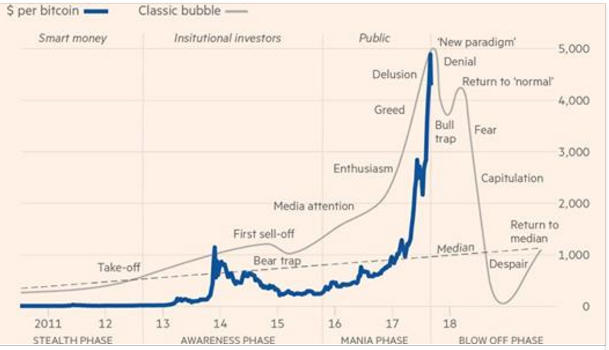Will the SEC break the Cryptocurrency Perpetual-Motion Machine?
The cryptocurrency complex was down nearly across the board today (July 25th) with but a few of the 1,010 virtual currencies showing positive gains versus the U.S. Treasury’s raggedy old paper dollar. Among the winners were something called Beavercoin up over 18 percent and Carboncoin up close to 50 percent.
In a podcast for Grant’s Interest Rate Observer, Trey Reik of Sprott Asset Management spoke at length with Jim Grant and Evan Lorenz about cryptocurrencies and something even more old school than the dollar--gold.
Reik wrote in his letter,
Bitcoin is the market leader in the emerging asset class of digital currencies. Importantly, bitcoin is based on blockchain technology, which is essentially a distributed database used to maintain a constantly growing list of records, called blocks. Each block contains a timestamp and a link to the previous block. In essence, the blockchain permanently stores a history of all previous transactions and participants and is simultaneously updated across a vast array of global computers to provide instant and fully transparent proof of authenticity to all users. By all accounts, the blockchain is potentially the most disruptive technology since the advent of the internet. Its applications are virtually limitless. However, it is important to differentiate between the blockchain and bitcoin. They are not one and the same. Bitcoin is simply the leading brand in the blockchain’s first emerging application (digital currency). While bitcoin’s lead in the cryptocurrency market is currently substantial, there is no guarantee bitcoin will ultimately prove to be the widely adopted crypto winner. Bloomberg (7/12/17) informs us that a grand total of three of the 500 largest internet merchants currently accept bitcoin for payment, down from five one year ago. The digital currency industry is in its early infancy, and many of the world’s smartest and most resourceful scientists, entrepreneurs and financiers are laser-focused on developing superior technologies to address bitcoin’s perceived shortcomings.
Mr. Reik penned a letter on cryptos dated July 20 and he tells Grant there were 973 cryptocurrencies when he wrote the letter. Over the weekend 13 were created and now as I write another two dozen have entered the virtual money fray. Currency developers are working faster than Hayek ever imagined.
This is all reminiscent of the South Sea Bubble. In 1711, with England eyeing John Law’s Mississippi Bubble with envy, the South Sea Company was born to capitalize on the colonization and resource-exploitation efforts ongoing in the New World. The company was ostensibly created to assume a trading monopoly with Spanish colonies, but its real business was the refinance British government debt through share issues.
Alex Planes writes for The Motley Fool, “The South Sea Company's skyrocketing valuation led to the public offerings of many other speculative -- and often fraudulent -- enterprises, which promised all sorts of zany schemes (hair-trading and perpetual-motion wheels among them) in exchange for investor funds.”
The politically-connected South Sea Company hated the competition and convinced government to pass The Bubble Act, requiring joint-stock companies to obtain a royal charter to trade on public markets.”
As stocks in the perpetual motion companies and the like crashed, so did the shares of the South Sea Company.
In the here and now, Reik writes, “ the number of cryptocurrency hedge funds is fast approaching forty! In short, while the ultimate number of bitcoins may be limited in supply, there is absolutely no limit to competing cryptocurrencies.”
While crypto land seems to be laissez faire paradise, the SEC views it as part of its regulatory domain. Bloomberg reports, “Companies that raise money through the sale of digital assets must adhere to federal securities laws, the Securities and Exchange Commission said Tuesday.”
“It’s been a long time coming and this is a big deal,” said Angela Walch, associate professor at St. Mary’s University School of Law told Bloomberg. “People have been waiting for some kind of signal from regulators on ICOs.”
Ms. Walsh says the SEC is finally providing guidance for digital currencies and the exchanges where they trade fit into financial markets. “It’s a reminder that basic consumer protection principles still apply” in the digital asset world, she added. “The tech people coming in don’t necessarily realize they’re playing with fire.”
Grant and Reik speculate that digital coin offerings will heretofore be considered securities, or as in India, be taxed as a collectible. The SEC confirms their suspicions with a report saying it wanted “to caution the industry and market participants: the federal securities laws apply to those who offer and sell securities in the United States, regardless whether the issuing entity is a traditional company or a decentralized autonomous organization, regardless whether those securities are purchased using U.S. dollars or virtual currencies, and regardless whether they are distributed in certificated form or through distributed ledger technology.”
This sounds like The Bubble Act all over again. Professor Walch told Bloomberg, “Those in the crypto world have been acting as if they live in an alternate universe, and the SEC has delivered a reminder that they still live in the real world, with real investors and real people making decisions that they must be accountable for.”
Government intrusion may be what stops these perpetual motion currencies.







